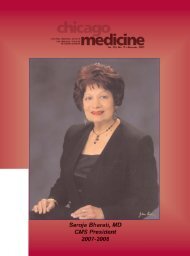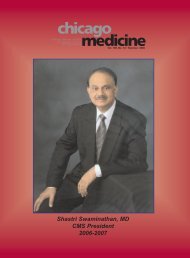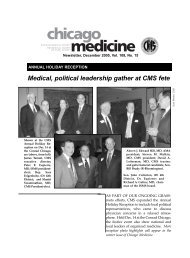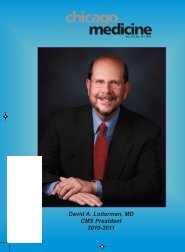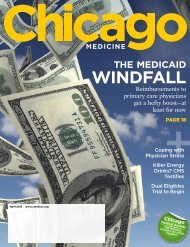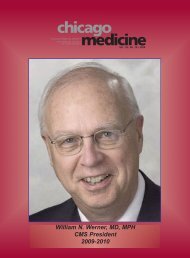Summer 2003 - Chicago Medical Society
Summer 2003 - Chicago Medical Society
Summer 2003 - Chicago Medical Society
Create successful ePaper yourself
Turn your PDF publications into a flip-book with our unique Google optimized e-Paper software.
The national beatStates see movement on medical liability reformResponding to the dire need for national tortreform, several states have taken local action.In Florida, for instance, Gov. Jeb Bushsigned a compromise medical liability reformpackage into law last August. While it could notwholly endorse the bill, the Florida <strong>Medical</strong> Association(FMA) called the legislation "a first step" inrestoring common sense to that state's liability system.One of its key highlights is a provision inwhich physicians providing emergency carewould be subject to a cap of only $150,000 for noneconomicdamages. (Arkansas, Georgia, Mississippi,Nevada, Ohio and Pennsylvania have allpassed tort reform packages in the past year withno cap or one higher than $250,000, according toAMNews (Sept. 1). Nevada's and Ohio's reformsincluded $350,000 caps; Mississippi enacted a$500,000 limit. Georgia, Arkansas and Pennsylvaniadid not include any cap. California, Colorado,Indiana, Louisiana, New Mexico and Wisconsin allhave long-term medical liability reform, and arethe only six states currently not in crisis or headingin that direction.)In Texas, voters approved a constitutionalamendment limiting non-economic claims formedical malpractice to $750,000 per case. Underthis limit, an injured patient can collect a maximumof $250,000 from a physician and an additional$500,000 from one or more hospitals orhealth-care providers for pain and suffering.Awards for loss of income and medical expensesare not capped. This measure was supported bythe Texas <strong>Medical</strong> Association and other healthcareorganizations.So far, Texas has been the only state without anexisting non-economic damages cap to pass a$250,000 limit. The Idaho and West Virginia legislaturesthis year rolled back their existing non-economicdamages caps to $250,000, reports AMNews.This month in Connecticut a special session ofthe legislature will consider a $250,000 cap on noneconomicdamages; also in October, the MassachusettsHouse Judiciary Committee will hear a billGetting up front and heardDemonstrating the importance of political networking,Irving Park Suburban Branch President Daniel Schnuda,MD, (right) met earlier in the year with Illinois SenatePresident Emil Jones (D-<strong>Chicago</strong>) to discuss the negativeimpact various bills would have on physicians.that would cap non-economic damages at $500,000.In Illinois, where physicians have joined togetherfor decades to enact legislative change, these reformsoften have been undone by the IllinoisSupreme Court. Most recently, the Civil JusticeReform Amendments of 1995 were found unconstitutionalin 1997.Nationally, 72 percent of all Americans supportsome type of limit on damages for non-economiclosses, according to a <strong>2003</strong> Gallup Poll, and thevoters of Illinois are probably no exception."There is no doubt that Illinois voters would approvemedical liability reform, and most other tortreforms, if they had a chance to do so in a referendumsimilar to the recent vote in Texas. The highcost of liability insurance is threatening access toquality health care for many Illinois residents andthe problem is going to get worse without some relief,"said Ed Murnane, president of the IllinoisCivil Justice League (ICJL), based in <strong>Chicago</strong>."Unfortunately, it is not as easy for us to changeour laws in a Texas-style referendum," Murnane6 <strong>Chicago</strong> MedicineVol. 106, No. 11



